Thinking of Spring
This week: Thinking of Spring; Giving back to society: The warning has gone out; Torn between the options;
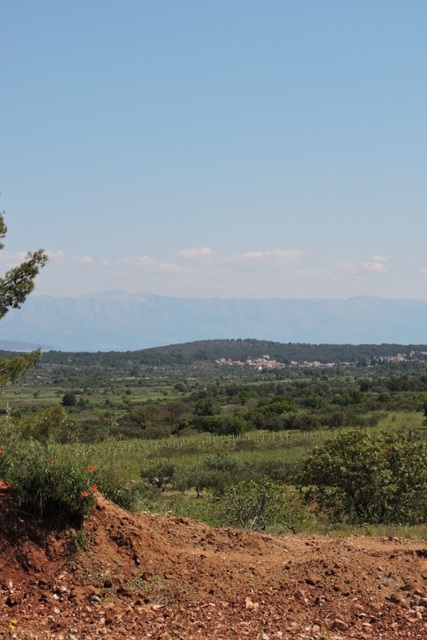
At school I vividly recall time moving so slowly that a snail could have overtaken it. The hands of the clock above the blackboard on the wall barely seemed to move.
This morning I was up early to watch the planetary conjunction of Venus and Jupiter. But was too late. The sky in the east was too bright. But I can try again tomorrow.
There are five planets in a row at the moment, low in the south eastern sky, just before dawn.
Dawn beginning to break here means around 04:00 in summer. It really does not seem long since dawn was 07:00, yet here we are, tomorrow is the first day of May.
I am reminded today as well of the inexorable passage of time. It is Callie’s 11th Birthday, so in human years she is the equivalent of 60 human years old.
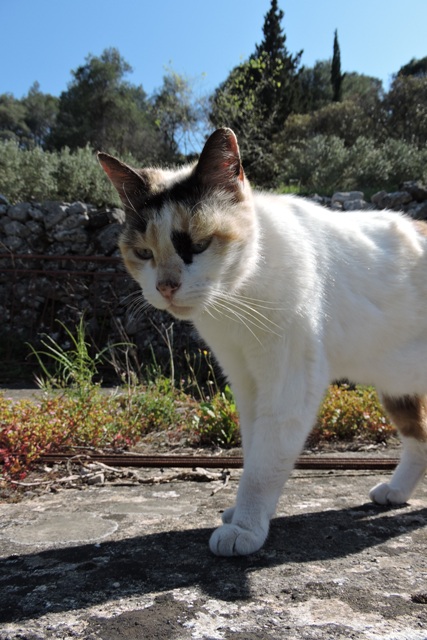
She and her sisters were born in Abu Dhabi. She was the first out of the nest to explore, in this photo just 14 days old. We will be having a special treat at tea time, her favourite, Tuna.

The time is passing very, very quickly.
Thinking of (next) spring
Here in southern Europe we are now into early summer. The temperature is around 25ºC at mid day and it drops to 15ºC overnight. Even so, we are ever so slightly below the average for this week of the year.

The good news is that the humidity is low at the moment, so the heat is comfortable.
Spring in Dol begins in December with the first bulbs flowering.
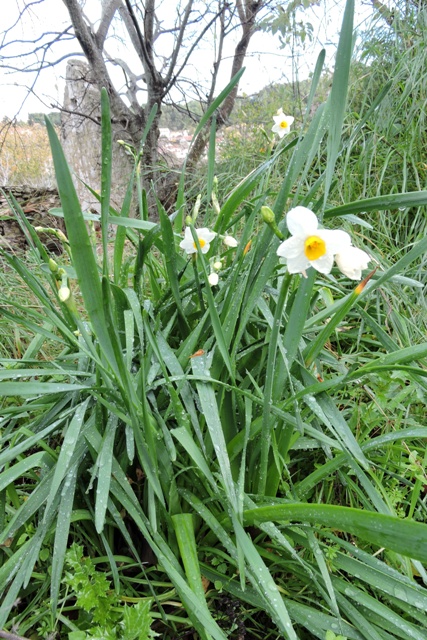
It is well in its stride by late February and is over by April, when the first summer migratory visitors having arrived.
The Bee Eaters were overhead today, in a flock and calling as they swooped and zoomed after insects.
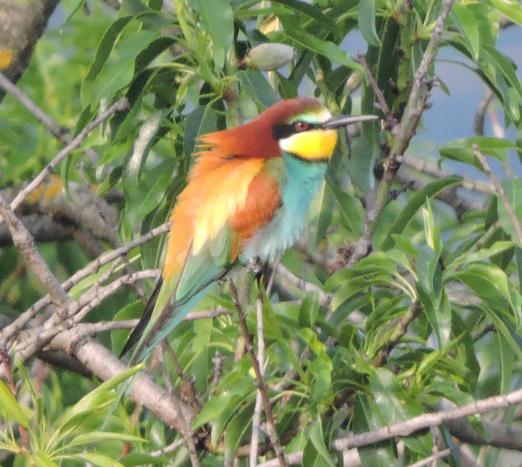
I also heard the raucous call of the Golden Oriol this afternoon. It is another of my Springwatch species. With just two more events to note, this year’s calendar is almost complete.
So as the apricots swell on my trees
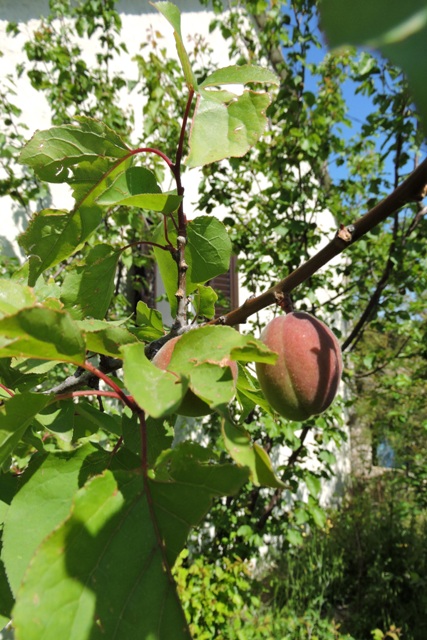
The cherry plums are turning red
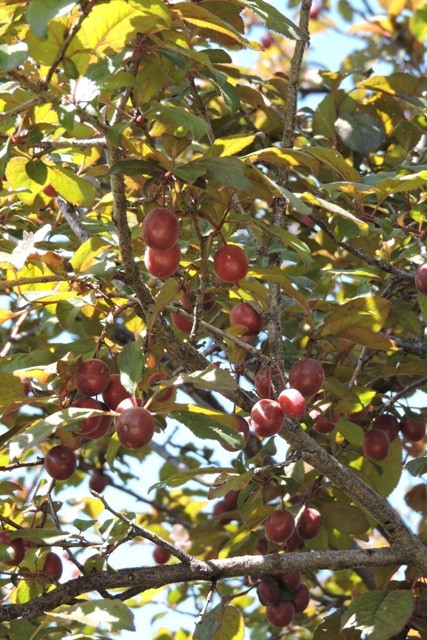
and I have harvested my first strawberries, I am already thinking of next spring.
Slowly but surely I am keeping ahead of the weeds in the Top Orchard. But only just!
The shrubs which I planted in the border are – all but one – doing OK. The exception is a Japanese Maple which I moved because it was being overwhelmed by Cana Lilies.
The border is narrow, just 90 cm wide, so that there is still space to work around the olive trees. which means that after the shrubs at the very back grow, there will be little room at the front of the border.
I have some low growing plants at the front, but I also had gaps.
This week I’ve filled one of the gaps with Hyacinth bulbs which I dug up from other parts of the orchards.

The Hyacinth gets its name from a plant named by the Greek writer and poet Homer. The flowers Homer wrote, sprang from the blood of a youth accidentally killed by the god Zephyr.
So this story places the flowers in the “Bizantine empire” of the eastern Mediterranean, from where it has spread throughout the Mediterranean Basin and has been transported around the world.
Although there are so called “Wild Hyacinth”, they are not thought to be the flowers described by Homer.
My Hyacinth are certainly naturalised, some deep in the rocky soil, however I suspect that they are more likely to have been purchased by previous residents of my home, perhaps as indoor plants, and then thrown out when they stopped flowering.
If they were wild, then the sloping hillside behind my home would also have them, and there are none.
This week I have dug up around 30 bulbs and have replanted them in a stand in the border, where they should look really nice next spring.
I’ll share photographs next year, to show you the before and after shots!
Giving back to society
One of the regular readers of my blog works tirelessly on environmental issues and also in support of the very many cats which live semi feral lives in the towns and villages on the island.
There is a “Trap-Neuter-release” (TNR) programme here now, which didn’t exist five years ago, so the number of strays is beginning to drop. However there are still large numbers of strays.
Around any of the rubbish bins, in any of the settlements, there is likely to be a colony of cats. Whilst they do keep the rat population in check, they also scavenge for food for themselves and their kittens.
I was given a huge compliment a few weeks back, when I was asked as probably “The handiest man on the island”, if I could design and build a combined feeding station and small shelter for the street cats.
These will be placed in strategic locations, with information about why they are there.
The dry food dispensers have already been purchased, so I set about building a concept shelter.
My terms of reference were very loose, but I decided that the finished design needs to be sturdy, weatherproof, substantial enough to last and most of all, easily constructed from readily available local materials.
Having built the first frame out of pieces of wood I had left over from other projects, I needed to buy some siding and waterproof marine plywood for the roof.
These are not materials I use regularly, so I had none in my wood stock. Everything was delivered last Friday morning, but the rainy weekend meant I couldn’t immediately use the courtyard for construction work.
This week I started by cutting the four meter lengths of siding and then nailing each piece to the completed frame.
Once everything was square, I cut the marine plywood sheet.
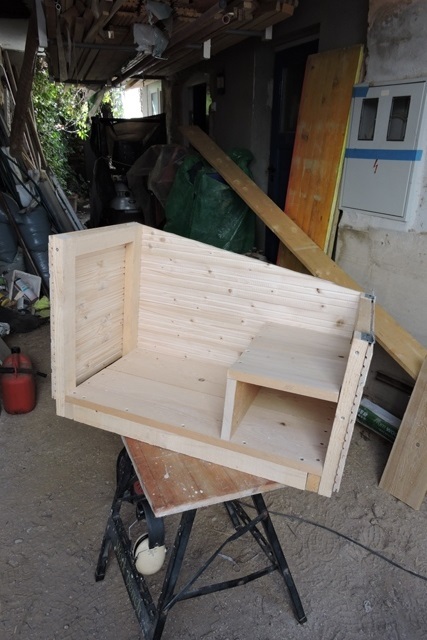
One of my ideas is to produce kits of ready cut materials, complete with screws for people to assemble their own feeding station. I also thought that with a set of plans, any joinery workshop on the island could also make them up, following the standard design.
I have been very careful with the design so that there is almost no wastage from standard timber lengths that can be purchased from any builders merchant here.
This does mean that the wood is rather ‘rough and ready’ but it is a functional unit not a piece of artwork.
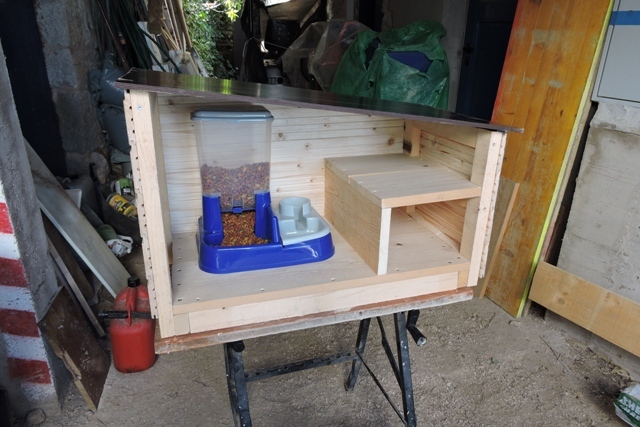
After completing the building of the first model, and carefully drawing the design, measurements and construction, it was handed over on Friday morning.
What I am aiming for is a set of “IKEA” style instructions.
I’m sure you know the kind which have no written words, so that anyone with a hammer, a screwdriver and the kit can assemble one from scratch. There will be no words, just pictures.

Time will tell if I have met my objective.
I derive a lot of pleasure living here with my felines and they have the best life I can provide for them.
It is nice to be able to put something back into the local community, for the less fortunate felines on the island.
My felines seem to like the feeding station, even though they have a dedicated place of their own in the dining room already.
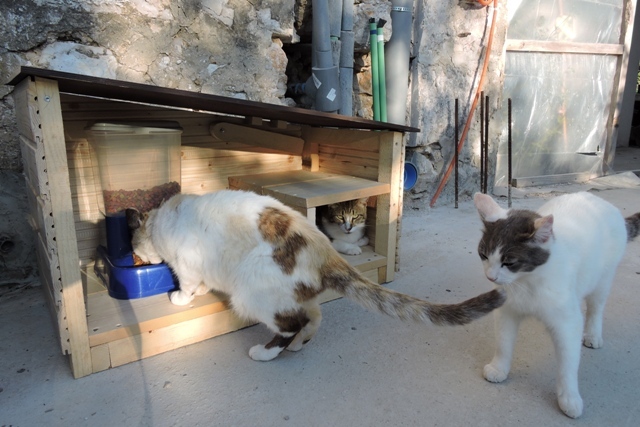
The warning has gone out
Meeting one reader this week I heard Chapter and Verse about the local highways contractor who has been spraying roadside verges with a very powerful herbicide over the past few days.
This is completely illegal as the verges are protected because of the huge number of wild flowers and native plants which inhabit them.
Then there are the reptiles and insects which use them, mammals which graze them and so on.
So on my way back from Jelsa one morning, I was delighted to see that the roadsides appear not to have been touched.
I say “appear” because even industrial herbicide doesn’t act immediately. It takes a few days for the foliage to start to turn yellow, then brown and to die back.
Our verges have a huge number of endemic plants, because of the alkaline nature of the soil. There are many endangered species, for example the Orchids which only grow there.
Along one short stretch I saw large patches of the Sage Leaved Rock Rose, Cistus salvifolius.
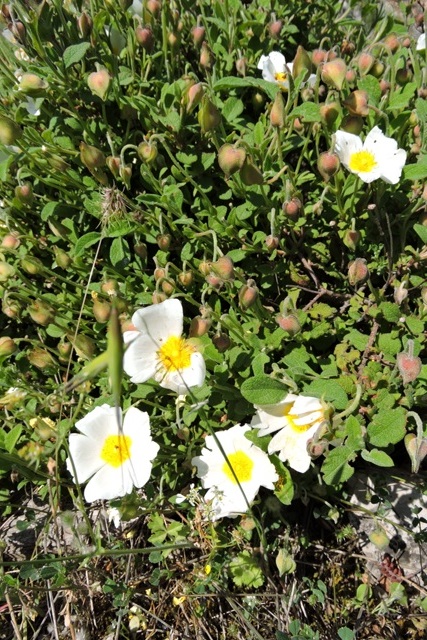
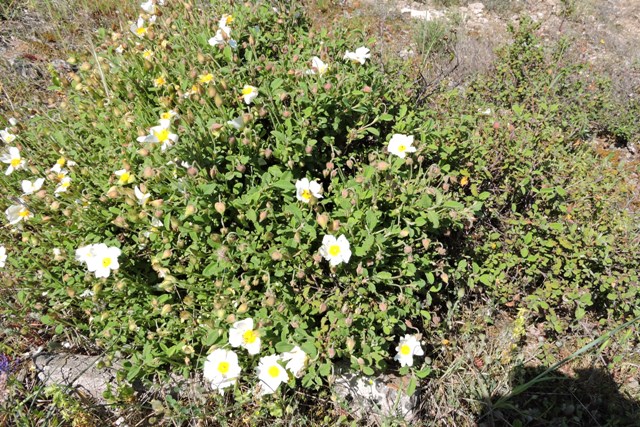
I have a few of these in my orchards, but there are swathes of blue by the sides of the roads. Leopoldia comosa, the Tasselled Hyacinth. It only flowers for a few short weeks at the end of April and early May each year.
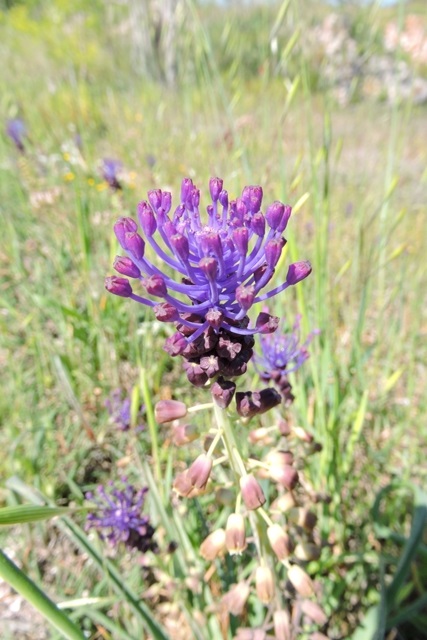
Less visible – you need to venture into the Maquis to find them – but the wild Cyclamen, Cyclamen repandum, are all in flower this week too.
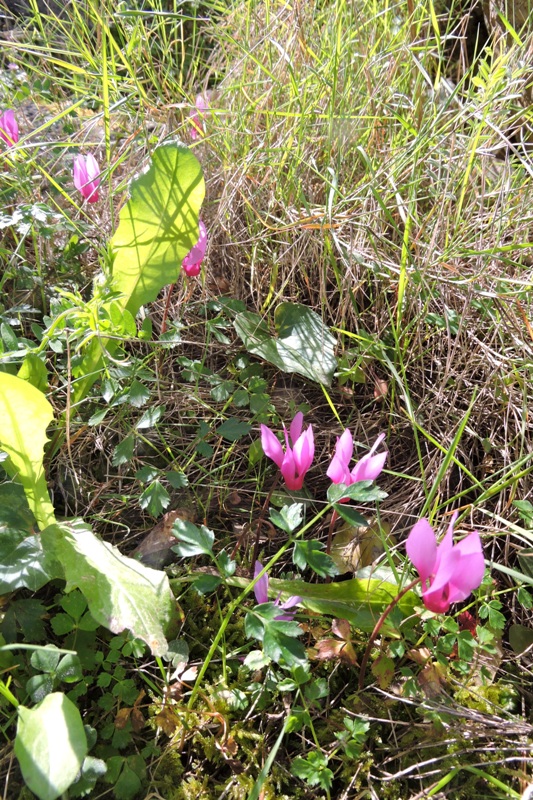
They love the limestone soil and a shady area.
Torn between the options
Sometimes the more I read, the more difficult it becomes to make the right decision!
Often there are no wrong answers, just different outcomes. That idiom can be applied almost universally across life I suppose.
As the weeds grow ever higher, I think of the definition of a weed – right plant, wrong place.
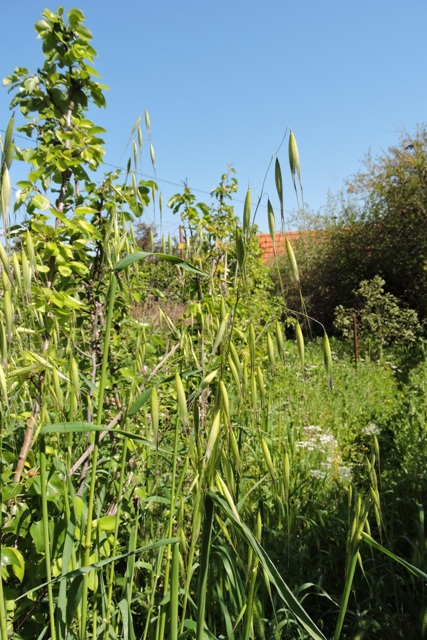
I set about cutting the weeds and grass in the Citrus and Drupe orchards this week.
In previous years, I have tried to keep the soil between the fruit trees clear. Then other work got in the way, and soon after you couldn’t see where I have been.
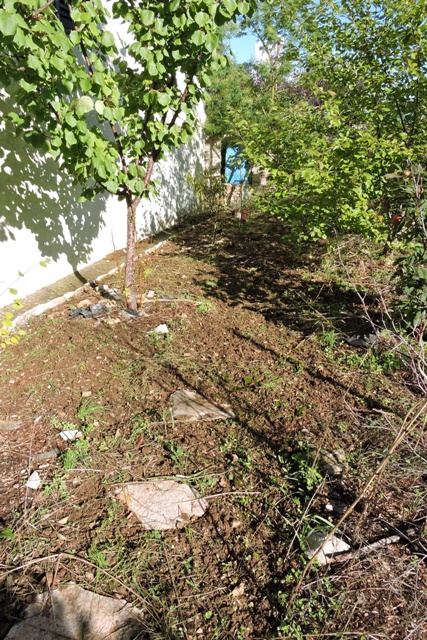
Over the last couple of years, I have tried a “No dig” policy, and have planted things like Yellow Rattle, Rhinanthus minor, which was supposed to throttle everything else.
It didn’t grow. Not one single plant! May be it didn’t like my soils?
The building work last year in the Konoba seriously curtailed orchard chores, with the result that this year I have a large number of tall thistles, tall grasses and myriad other wild flowers which are taking moisture from the fruit trees.
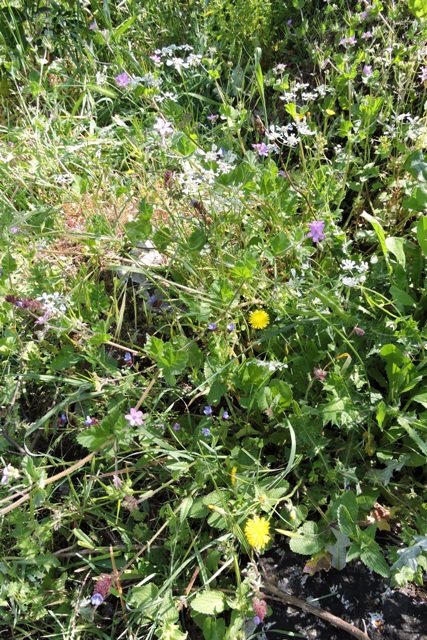
As I began cutting the thistles, I realised that Swallowtail butterflies were feeding on them. But at the same time they are going to seed.
This happened last year, and now look at the problem!
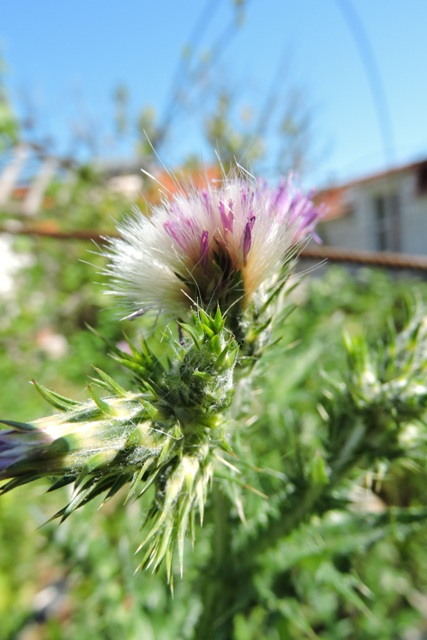
So what to do?
I have a very shot window of opportunity at the moment to take the seed heads of everything, and prevent even more growing next year.
Or I can leave everything and do some other jobs and just let nature take it’s course. There is a middle option though, which is what I opted for.
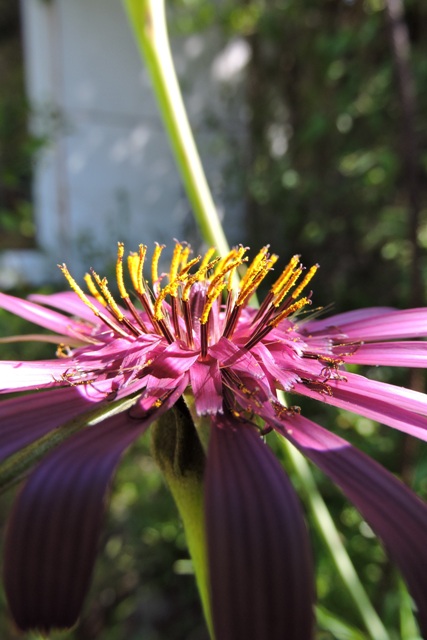
In amongst the thistles and grasses, there are some nice weeds, like this Wild Salsify, Tragopogon porrifolius, which I want to keep.
Even though it has a huge thistle like seed head, only a few seem to germinate each year.
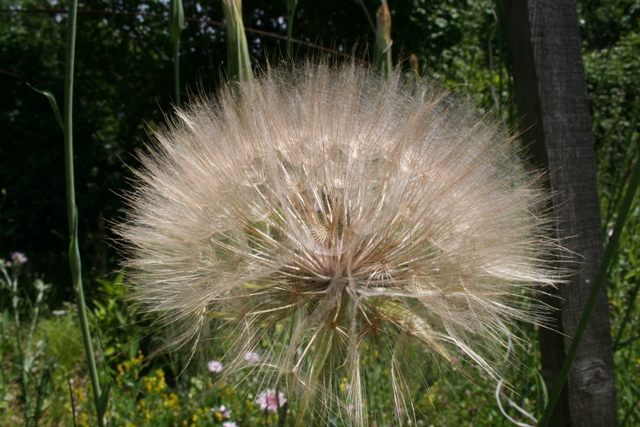
There are really unusual plants, here the Star of Bethlehem or 11 O’ Clock Lilly, Ornithogalum umbellatum, because the flowers only open in mid-morning.
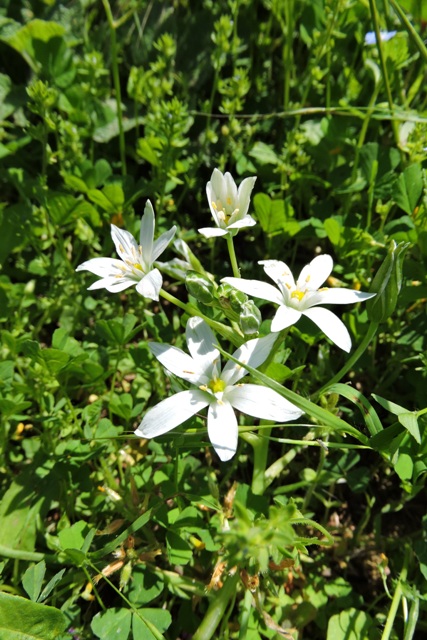
By cutting around the fruit trees by hand, rather than with a strimming machine, I can cut the plants which readily seed and save the ones which seem to struggle.
Where I have cut, I am leaving the remains for the time being.
I moved several loads of cut grass to the compost heap, but reasoned that this layer of vegetative matter will protect the thin soils and any insect eggs will still be able to hatch.
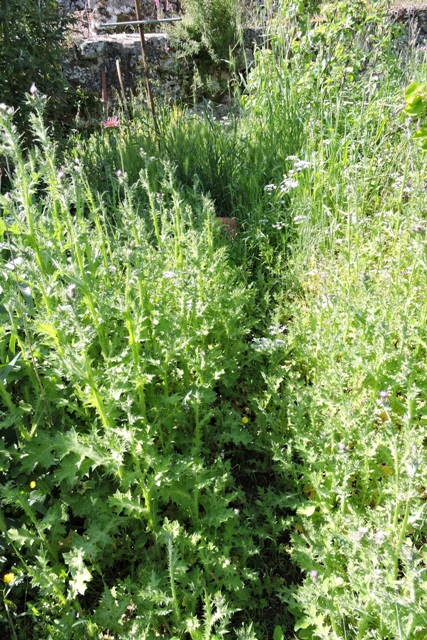
I have made good progress, but still have more to do before the seeds mature and disperse.
I am always on the lookout for Triffids though, just in case one attacks me… NCG
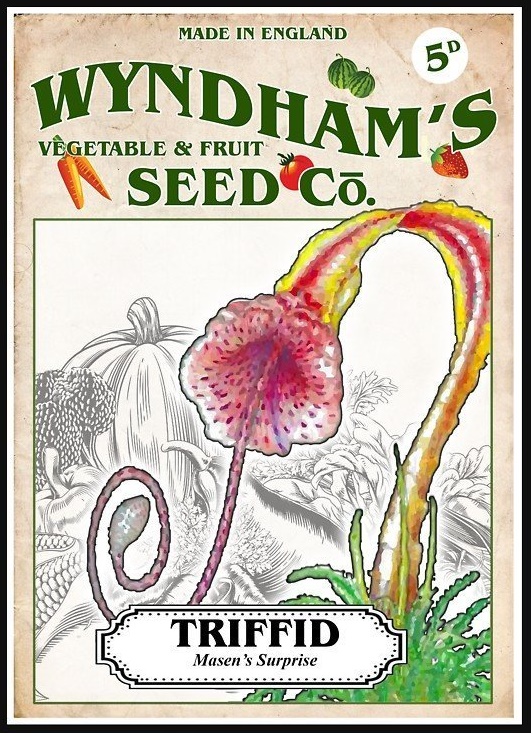
One Response
Marie-Luise
Happy Birthday Callie!
All the best to you and sunny greetings from Salzburg, also from Noah. 🐈⬛